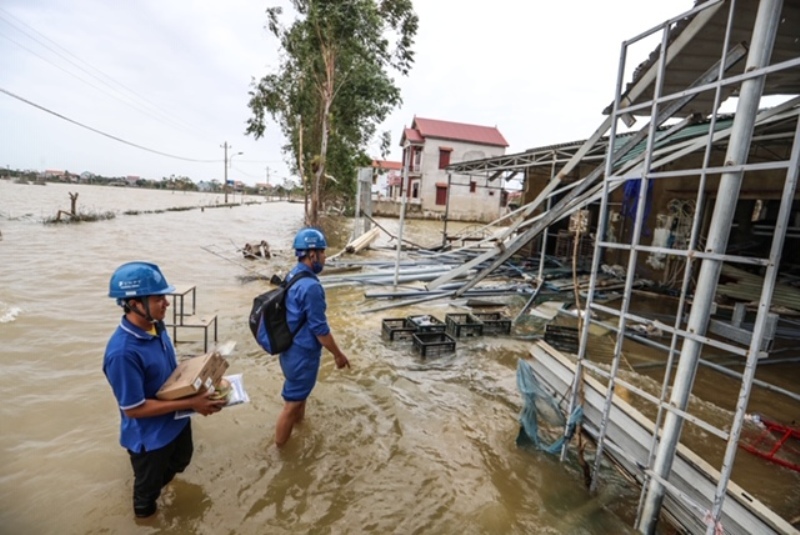In recent days, storms and floods have raged in the central provinces and the central highlands, causing a lot of damage to businesses. So, in order to keep up with the pace of production, do enterprises have the right to ask employees to work overtime after the storm in accordance with Vietnam’s regulations?

It is not only people but businesses also suffer damage from storms and floods: factories are destroyed, production and business activities are interrupted, the supply chain between businesses and partners is stalled, etc. To overcome this situation, many businesses now tend to ask employees to work overtime to keep up with the pace of production and business. However, enterprises that require employees to work overtime must comply with current laws.
According to Clause 2 Article 106 of the Labor Code 2012 of Vietnam, conditions for overtime work are as follows:
2. An employer may request an employee to work overtime upon fully meeting the following conditions:
a/ Obtaining the employee’s consent;
b/ Ensuring that the number of overtime working hours of the employee does not exceed 50% of the normal working hours per day; in case of applying regulations on weekly work, the total of normal working hours and overtime working hours must not exceed 12 hours per day; does not exceed 30 hours per month and the total of overtime working hours must not exceed 200 hours per year, except some special cases as stipulated by the Government in which overtime working hours must not exceed 300 hours per year;
c/ After each period with many consecutive days of working overtime within a month, the employer shall arrange compensatory days off for the employee.
According to the above provision, businesses are only allowed to request an employee to work overtime when obtaining the employee’s consent, ensuring the number of overtime working hours as prescribed by law and arranging compensatory days off for employees. Moreover, cases of 200-300 overtime hours in a year is specified in Article 4 of Decree No. 45/2013/NĐ-CP of Vietnam’s Government as follows:
- Production and processing of textiles, garments, leather, shoes, agricultural, silvicultural, and aquaculture products;
- Electricity supply, telecommunication services, oil refinery, water supply and drainage;
- Other urgent cases in which work must not be postponed.
Wage for overtime work is specified in Article 97 of the Labor Code 2012 of Vietnam as follows:
Article 97. Wage for overtime work and night work
1. An employee who performs overtime work must be paid according to the wage unit or wage for his/her current job as follows:
a/ On normal days, at least equal to 150%;
b/ On weekends, at least equal to 200%;
c/ On public holidays and paid leave days, at least equal to 300%, excluding the wage for public holidays and paid leave days of employees who receive daily wages.
2. An employee who performs night work must be paid with an additional amount at least equal to 30% of the wage calculated according to the wage unit or the wage for a job performed during normal workdays.
3. An employee who performs overtime work at night must be paid under Clauses 1 and 2 of this Article. He/she must be paid with an additional amount equal to 20% of the wage calculated according to the wage unit or the wage for a job performed during daytime.
However, businesses may request an employee to work overtime in any days and the employee may not refuse in the following cases:
- Implementing a call-up or mobilization order to ensure national defense or security in an emergency state of national defense or security as provided by law;
- Implementing the tasks to protect human lives and assets of agencies, organizations or individuals in the prevention and remediation of consequences of a natural calamity, fire, epidemic or disaster.
When the Labor Code 2019 of Vietnam takes effect on January 01, 2021, provisions on overtime work of Labor Code 2012 are basically unchanged, except for the following 02 changes:
- Increasing the limit on the number of overtime hours of employees in 01 month from no more than 30 hours/month to no more than 40 hours/month;
- In case the employer request the employee to work overtime in special cases for performance of tasks necessary to protect human life or property of certain organizations or individuals in the prevention and recovery of natural disasters, fires, epidemics and disasters, employee has the right to decline in cases those tasks threaten the employees’ health or life as prescribed by occupational safety and health laws.
Therefore, after the flood, if not in special cases, the employer is only allowed to request the employee to do compensatory work when satisfying the 03 conditions specified in Clause 2 Article 106 of the Labor Code 2012 of Vietnam. Above are the regulations on overtime that employees need to know to protect their rights.
Phuong Thanh
 Article table of contents
Article table of contents










.Medium.png)
.Medium.png)
.Medium.png)
.Medium.png)
